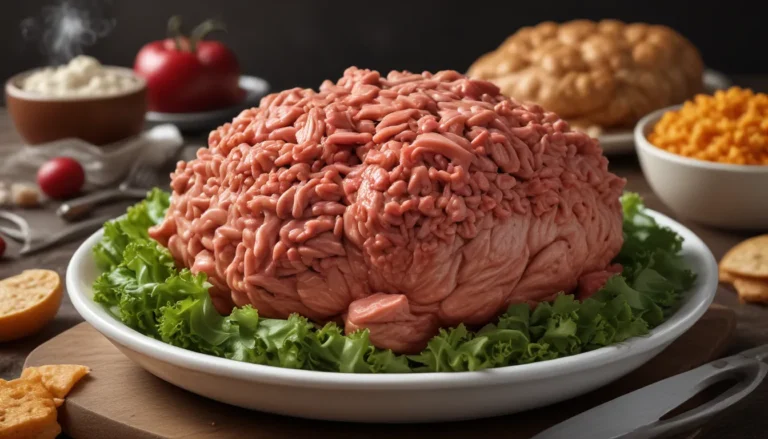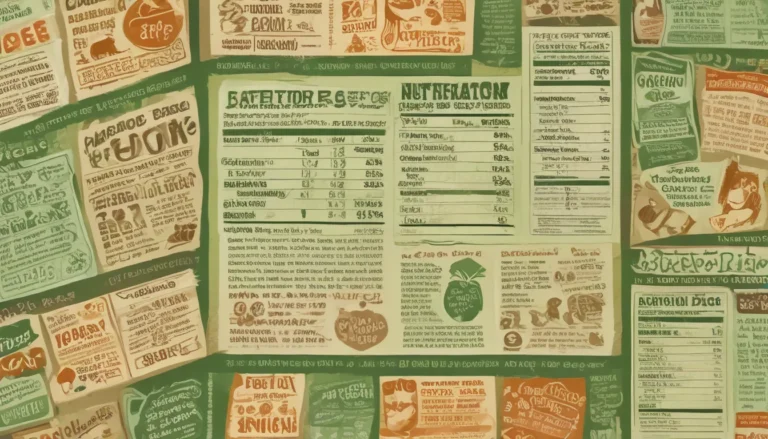The pictures in our articles might not always show exactly what the text is talking about. We use these images to make the article more interesting and eye-catching. They are there to add to the text, but not to replace it or show every detail.
Peanuts are more than just a popular snack – they are an incredible source of nutrients and have a rich history dating back thousands of years. In this article, we will delve into 19 captivating facts about peanuts that will expand your knowledge and appreciation for these versatile legumes. From their unique botanical classification to their wide array of culinary uses, there is so much to learn about peanuts. So, sit back, grab a handful of your favorite peanut variety, and let's explore the remarkable world of peanuts together!
Unveiling the Truth: Peanuts are Legumes, Not Nuts!
Contrary to common belief, peanuts are not classified as nuts; they actually belong to the legume family, alongside beans and lentils. What sets peanuts apart is their growth underground in pods, making them quite distinct from tree nuts.
A Name Rooted in History: Meet Arachis Hypogaea
The scientific name for peanuts, Arachis hypogaea, tells a fascinating story of their underground cultivation. "Arachis" translates to "groundnut" in Greek, while "hypogaea" means "below the Earth" – a fitting moniker for this unique plant.
A Nutrient Powerhouse: The Marvels of Peanut Nutrition
Peanuts boast an impressive nutritional profile, being rich in protein, fiber, healthy fats, vitamins, and minerals. Additionally, peanuts are laden with antioxidants, which play a crucial role in shielding the body from oxidative stress.
Energize Your Day: Peanuts as a Source of Sustained Energy
Thanks to their calorie-dense nature, peanuts serve as an excellent source of sustained energy, making them a favored choice among athletes and individuals with active lifestyles.
Tread Carefully: The Prevalence of Peanut Allergies
Peanut allergies are among the most widespread food allergies, affecting individuals of all ages. Even minute traces of peanuts can trigger severe allergic reactions in susceptible individuals, underscoring the importance of vigilance in reading food labels.
Cultivating Success: The United States Leads in Peanut Production
The United States holds the distinction of being the top global producer of peanuts, with states like Georgia, Texas, and Alabama at the forefront of peanut cultivation. Peanuts not only play a vital economic role but also find diverse applications, from the production of peanut butter to sustainable farming practices.
Longevity in a Shell: The Remarkable Shelf Life of Peanuts
Owing to their high oil content, peanuts have an impressive shelf life when stored correctly. They can retain their freshness for several months, making them a pantry staple with enduring value.
Spread the Love: The Allure of Peanut Butter
Peanut butter enjoys widespread popularity as a versatile and delectable spread crafted from ground peanuts. Whether smeared on sandwiches, paired with fruits, or utilized in culinary creations, peanut butter is a beloved household staple.
Global Gastronomy: Peanuts in Asian Cuisine
Asian culinary traditions, spanning Thai, Vietnamese, and Chinese cuisines, embrace peanuts as a pivotal ingredient in dishes like satay, pad thai, and kung pao chicken, highlighting the universal appeal of peanuts.
Liquid Gold: The Culinary Versatility of Peanut Oil
Peanut oil, extracted through the pressing of peanuts, serves as a common cooking and frying medium. Renowned for its high smoke point and subtle nutty flavor, peanut oil adds a distinctive touch to a myriad of dishes.
In the Spirit of Sport: Peanuts at Ball Games
Crunchy and satisfying, peanuts have long been associated with sporting events, particularly baseball games. Roasted and salted peanuts are a perennial favorite among spectators, enhancing the thrill of the game.
Beyond Consumption: The Multi-Faceted Uses of Peanut Shells
Post-harvest, peanut shells find diverse applications, serving as animal feed, enriching compost, and even fueling biomass. This sustainable approach underscores the holistic utilization of all parts of the peanut plant.
Harnessing the Power of Resveratrol: The Antioxidant Bounty in Peanuts
Peanuts are rich in resveratrol, a natural plant compound lauded for its antioxidant properties and potential health benefits, including heart health and longevity, further accentuating the nutritional prowess of peanuts.
Nurturing Economies: The Economic Significance of Peanuts
The peanut industry contributes significantly to the economy, fostering billions of dollars in economic activity and supporting the livelihoods of farmers, processors, manufacturers, and allied sectors involved in peanut production.
A Feast for the Senses: The Diverse Preparations of Peanuts
Whether roasted to intensify their flavor, boiled for a softer texture, or savored raw as a wholesome snack, peanuts offer a spectrum of culinary possibilities to tantalize the taste buds.
The Green Thumb’s Ally: Peanuts as Champions of Sustainable Farming
Peanuts play a pivotal role in sustainable agriculture by enhancing soil quality through nitrogen fixation, thereby reducing the necessity for synthetic fertilizers. Their low water requirements further underscore their eco-friendly farming potential.
Fueling Innovation: Peanut Shells as Biofuel Sources
Peanut shells, a byproduct of peanut processing, can be repurposed into biofuels such as briquettes or pellets, offering a renewable and environmentally conscious alternative to conventional fossil fuels.
Handle with Care: The Serious Implications of Peanut Allergies
For individuals with peanut allergies, even slight exposure to peanuts can trigger severe and potentially life-threatening reactions, leading to anaphylaxis. Therefore, exercising caution, reading food labels diligently, and preventing cross-contamination are paramount.
An Ancient Legacy: Tracing the Origins of Peanuts
With a history stretching back millennia, peanuts have a rich heritage rooted in South America. Their cultivation dates back to 7,600 years ago and their subsequent introduction to Europe and beyond during the 16th century speaks to their enduring global influence.
Conclusion: Embrace the Versatility and Nutritional Bounty of Peanuts
In conclusion, peanuts stand out as a versatile and nutritious culinary delight, offering a plethora of essential nutrients and health benefits. Whether relished as a snack, incorporated into delectable spreads like peanut butter, or featured in diverse recipes, peanuts bring a delightful crunch and flavor to the table. Remember to enjoy peanuts in moderation, given their caloric density. Should you have any allergies or health concerns, consulting with a healthcare professional before integrating peanuts into your diet is advisable. Indulge in the goodness of peanuts and reap the rewards they have to offer, enhancing your culinary experiences and well-being in the process.
FAQs: Demystifying Common Queries About Peanuts
- Are peanuts actually nuts?
-
Contrary to popular belief, peanuts belong to the legume family, not nuts.
-
Can peanuts cause allergies?
-
Yes, peanuts are a common allergen, and individuals with peanut allergies should avoid them.
-
Are peanuts high in fat?
-
While peanuts contain some fat, the majority is healthy unsaturated fat.
-
Can peanuts help with weight loss?
-
Peanuts can aid in weight loss due to their protein and fiber content, but moderation is key.
-
Are raw or roasted peanuts better?
-
The choice between raw and roasted peanuts is subjective, as both offer distinct flavors and textures.
-
Can peanuts benefit heart health?
-
Peanuts contain heart-healthy fats and antioxidants that support cardiovascular well-being.
-
Are peanuts a good protein source?
-
Yes, peanuts are an excellent plant-based protein source suitable for vegetarians and vegans.
-
Can peanuts lower cholesterol levels?
-
Studies suggest peanuts can help reduce LDL cholesterol levels when consumed moderately.
-
Do peanuts support brain health?
-
Peanuts contain nutrients vital for brain function like vitamin E, folate, and niacin.
-
Are peanuts gluten-free?
- Yes, peanuts are naturally gluten-free, making them ideal for those following a gluten-free diet.
Explore Beyond Snacking: Delve into the World of Peanut Products
The versatility of peanuts extends beyond snacking and cooking, encompassing a wide array of innovative products. Curious about the nutritional profile of peanut butter? Dive into our articles on Peanut Butter Cheerios, Skippy Peanut Butter, and Kind Bars to unravel the nutritional intricacies of these beloved products. Whether you seek health-conscious insights or indulge in the creamy allure of peanut butter, our informative resources will equip you with knowledge to make informed choices and satiate your peanut butter cravings.
Feedback Welcome: Your Voice Shapes Our Content
Our dedication to delivering engaging and credible content lies at the core of our mission. Each fact featured on our platform originates from real contributors like you, offering a multitude of perspectives and insights. Upholding the highest standards of accuracy and reliability, our meticulous editorial team ensures that every fact shared is not only captivating but also authentic. Trust in our ongoing commitment to quality and authenticity as you embark on a journey of exploration and learning with us.
In conclusion, peanuts embody a harmonious blend of nutrition, versatility, and sustainability, positioning them as a quintessential culinary staple with enduring appeal. Whether enjoyed as a wholesome snack, a sumptuous spread, or a flavorful ingredient in diverse cuisines, peanuts add a touch of delight and nourishment to our lives. Embrace the wonders of peanuts and savor their myriad benefits, enriching your culinary adventures and well-being along the way.





